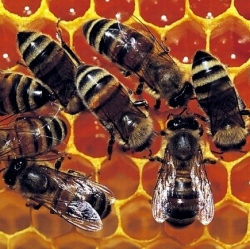
Plants have a serious thing for bees and have evolved to go to great lengths to attract their buzzing pals. We know the sweetness of the nectar or the tantalising smell of flowers bring the bees in to get down to the business of pollination. But would you believe some plants actually have small doses of caffeine that have bees coming back again and again?
Anyone who has seen the line at Starbucks before work is sure to understand. We seem to get down to our business just a bit more efficiently.
The low doses of caffeine in certain floral nectar – such as citrus and coffee plants – appears to trigger enhanced memories in bees that brings them back to the plant again and again. That’s not just good for the bee but it’s also good for the plant – essentially ensuring regular pollination and creating an ecological bond between the two.
The connection was discovered by Dr. Geraldine Wright, neuroscientist at Newcastle University in England. She and her team started with experiments to see if bees associated door with a reward. They used sugar water and low doses of caffeine at the levels you’d find in plants to tempt them. The result was bees that formed a memory associated to the door that gave them the caffeine.
Even more interesting is the fact this wasn’t just a quick hit. when exploring the long term effects the researchers found three-times as many bees remembered the scent that carried the caffeine reward 24 hours later, and twice as many remembering even 72 hours later. The researchers then tested the effects of tiny amounts of caffeine on the tiny little neurons in bee brains (Kenyon cells) and found the caffeine did increase sensitivity in those cells – which just happen to be related to learning and memory.
Before we rush to hook up the IV of coffee or straight caffeine, the researchers want to remind us that human brains and insect brains are different and may not necessarily work the same way to actually improve memory.
